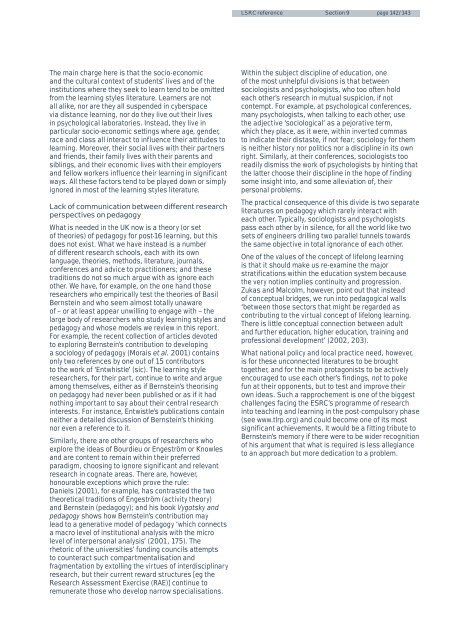learning-styles
learning-styles
learning-styles
Create successful ePaper yourself
Turn your PDF publications into a flip-book with our unique Google optimized e-Paper software.
LSRC reference Section 9<br />
page 142/143<br />
The main charge here is that the socio-economic<br />
and the cultural context of students’ lives and of the<br />
institutions where they seek to learn tend to be omitted<br />
from the <strong>learning</strong> <strong>styles</strong> literature. Learners are not<br />
all alike, nor are they all suspended in cyberspace<br />
via distance <strong>learning</strong>, nor do they live out their lives<br />
in psychological laboratories. Instead, they live in<br />
particular socio-economic settings where age, gender,<br />
race and class all interact to influence their attitudes to<br />
<strong>learning</strong>. Moreover, their social lives with their partners<br />
and friends, their family lives with their parents and<br />
siblings, and their economic lives with their employers<br />
and fellow workers influence their <strong>learning</strong> in significant<br />
ways. All these factors tend to be played down or simply<br />
ignored in most of the <strong>learning</strong> <strong>styles</strong> literature.<br />
Lack of communication between different research<br />
perspectives on pedagogy<br />
What is needed in the UK now is a theory (or set<br />
of theories) of pedagogy for post-16 <strong>learning</strong>, but this<br />
does not exist. What we have instead is a number<br />
of different research schools, each with its own<br />
language, theories, methods, literature, journals,<br />
conferences and advice to practitioners; and these<br />
traditions do not so much argue with as ignore each<br />
other. We have, for example, on the one hand those<br />
researchers who empirically test the theories of Basil<br />
Bernstein and who seem almost totally unaware<br />
of – or at least appear unwilling to engage with – the<br />
large body of researchers who study <strong>learning</strong> <strong>styles</strong> and<br />
pedagogy and whose models we review in this report.<br />
For example, the recent collection of articles devoted<br />
to exploring Bernstein’s contribution to developing<br />
a sociology of pedagogy (Morais et al. 2001) contains<br />
only two references by one out of 15 contributors<br />
to the work of ‘Entwhistle’ (sic). The <strong>learning</strong> style<br />
researchers, for their part, continue to write and argue<br />
among themselves, either as if Bernstein’s theorising<br />
on pedagogy had never been published or as if it had<br />
nothing important to say about their central research<br />
interests. For instance, Entwistle’s publications contain<br />
neither a detailed discussion of Bernstein’s thinking<br />
nor even a reference to it.<br />
Similarly, there are other groups of researchers who<br />
explore the ideas of Bourdieu or Engeström or Knowles<br />
and are content to remain within their preferred<br />
paradigm, choosing to ignore significant and relevant<br />
research in cognate areas. There are, however,<br />
honourable exceptions which prove the rule:<br />
Daniels (2001), for example, has contrasted the two<br />
theoretical traditions of Engeström (activity theory)<br />
and Bernstein (pedagogy); and his book Vygotsky and<br />
pedagogy shows how Bernstein’s contribution may<br />
lead to a generative model of pedagogy ‘which connects<br />
a macro level of institutional analysis with the micro<br />
level of interpersonal analysis’ (2001, 175). The<br />
rhetoric of the universities’ funding councils attempts<br />
to counteract such compartmentalisation and<br />
fragmentation by extolling the virtues of interdisciplinary<br />
research, but their current reward structures [eg the<br />
Research Assessment Exercise (RAE)] continue to<br />
remunerate those who develop narrow specialisations.<br />
Within the subject discipline of education, one<br />
of the most unhelpful divisions is that between<br />
sociologists and psychologists, who too often hold<br />
each other’s research in mutual suspicion, if not<br />
contempt. For example, at psychological conferences,<br />
many psychologists, when talking to each other, use<br />
the adjective ‘sociological’ as a pejorative term,<br />
which they place, as it were, within inverted commas<br />
to indicate their distaste, if not fear; sociology for them<br />
is neither history nor politics nor a discipline in its own<br />
right. Similarly, at their conferences, sociologists too<br />
readily dismiss the work of psychologists by hinting that<br />
the latter choose their discipline in the hope of finding<br />
some insight into, and some alleviation of, their<br />
personal problems.<br />
The practical consequence of this divide is two separate<br />
literatures on pedagogy which rarely interact with<br />
each other. Typically, sociologists and psychologists<br />
pass each other by in silence, for all the world like two<br />
sets of engineers drilling two parallel tunnels towards<br />
the same objective in total ignorance of each other.<br />
One of the values of the concept of lifelong <strong>learning</strong><br />
is that it should make us re-examine the major<br />
stratifications within the education system because<br />
the very notion implies continuity and progression.<br />
Zukas and Malcolm, however, point out that instead<br />
of conceptual bridges, we run into pedagogical walls<br />
‘between those sectors that might be regarded as<br />
contributing to the virtual concept of lifelong <strong>learning</strong>.<br />
There is little conceptual connection between adult<br />
and further education, higher education, training and<br />
professional development’ (2002, 203).<br />
What national policy and local practice need, however,<br />
is for these unconnected literatures to be brought<br />
together, and for the main protagonists to be actively<br />
encouraged to use each other’s findings, not to poke<br />
fun at their opponents, but to test and improve their<br />
own ideas. Such a rapprochement is one of the biggest<br />
challenges facing the ESRC’s programme of research<br />
into teaching and <strong>learning</strong> in the post-compulsory phase<br />
(see www.tlrp.org) and could become one of its most<br />
significant achievements. It would be a fitting tribute to<br />
Bernstein’s memory if there were to be wider recognition<br />
of his argument that what is required is less allegiance<br />
to an approach but more dedication to a problem.


